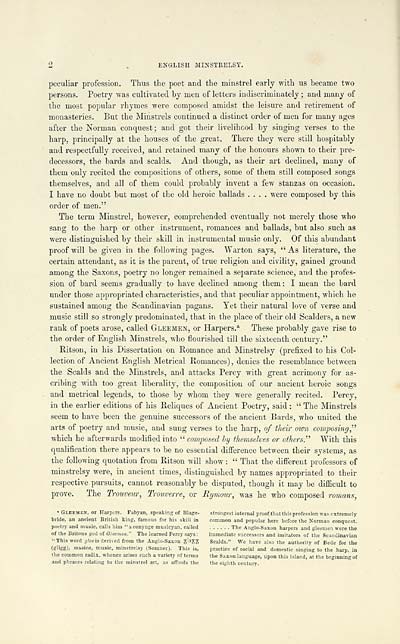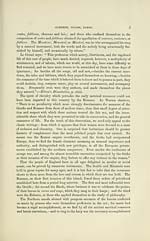Glen Collection of printed music > Printed text > Popular music of the olden time > Volume 1
(36) Page 2
Download files
Complete book:
Individual page:
Thumbnail gallery: Grid view | List view

2 , ENGLISH MINSTRELSY,
peculiar profession. Thus the poet and the minstrel early with us became two
persons. Poetry was cultivated by men of letters indiscriminately ; and many of
the most popular rhymes were composed amidst the leisure and retirement of
monasteries. But the Minstrels continued a distinct order of men for many ages
after the Norman conquest; and got their livelihood by singing verses to the
harp, principally at the houses of the great. There they were still hospitably
and respectfully received, and retained many of the honours shown to their pre-
decessors, the bards and scalds. And though, as their art declined, many of
them only recited the compositions of others, some of them still composed songs
themselves, and all of them could probably invent a few stanzas on occasion.
I have no doubt but most of the old heroic ballads .... were composed by this
order of men."
The term Minstrel, however, comprehended eventually not merely those who
sang to the harp or other instrument, romances and ballads, but also such as
were distinguished by their skill in instrumental music only. Of this abundant
proof will be given in the following pages. Warton says, "As literature, the
certain attendant, as it is the parent, of true religion and civility, gained ground
among the Saxons, poetry no longer remained a separate science, and the profes-
sion of bard seems gradually to have declined among them: I mean the bard
under those appropriated characteristics, and that peculiar appointment, which he
sustained among the Scandinavian pagans. Yet their natural love of verse and
music still so strongly predominated, that in the place of their old Scalders, a new
rank of poets arose, called Gleemen, or Harpers." These probably gave rise to
the order of English Minstrels, who floarished till the sixteenth century."
Ritson, in his Dissertation on Romance and Minstrelsy (prefixed to his Col-
lection of Ancient English Metrical Romances) , denies the resemblance between
the Scalds and the Minstrels, and attacks Percy with great acrimony for as-
cribing with too great liberality, the composition of our ancient heroic songs
and metrical legends, to those by whom they were generally recited. Percy,
in the earlier editions of his Reliques of Ancient Poetry, said : " The Minstrels
seem to have been the genuine successors of the ancient Bards, who united the
arts of poetry and music, and sung verses to the harp, of their own composing,^^
which he afterwards modified into " composed ly themselves or others." With this
qualification there appears to be no essential difference between their systems, as
the following quotation from Ritson will show : " That the difierent professors of
minstrelsy were, in ancient times, distinguished by names appropriated to their
respective pursuits, cannot reasonably be disputed, though it may be difficult to
prove. The Trouveur, Trouverre, or Eijmour, was he who composed romans,
" GiEEMEN, or Harpers. Fabyan, speaking of Blage- strongest internal proof that this profession was extremely
bride, an ancient British king, famous for his skill in common and popular here before the Korman conquest.
poetry and music, calls him "aconynge musicyan, called The Anglo-Saxon harpers and gleemen were the
of the Britons god of Gleemen." The learned Percy says : immediate successors and imitators of the Scandinavian
"This word i^teeis derived from the Anglo-Saxon SliJS Scalds." We have also the authority of Bade for the
(gligg), mmica, music, minstrelsy (Somner). This is, practice of social and domestic singing to the harp, in
the common radix, whence arises such a variety of terms the Saxon language, upon this island, at the beginning of
and phrases relating to the minstrel ai-t, as atfords the the eighth century.
peculiar profession. Thus the poet and the minstrel early with us became two
persons. Poetry was cultivated by men of letters indiscriminately ; and many of
the most popular rhymes were composed amidst the leisure and retirement of
monasteries. But the Minstrels continued a distinct order of men for many ages
after the Norman conquest; and got their livelihood by singing verses to the
harp, principally at the houses of the great. There they were still hospitably
and respectfully received, and retained many of the honours shown to their pre-
decessors, the bards and scalds. And though, as their art declined, many of
them only recited the compositions of others, some of them still composed songs
themselves, and all of them could probably invent a few stanzas on occasion.
I have no doubt but most of the old heroic ballads .... were composed by this
order of men."
The term Minstrel, however, comprehended eventually not merely those who
sang to the harp or other instrument, romances and ballads, but also such as
were distinguished by their skill in instrumental music only. Of this abundant
proof will be given in the following pages. Warton says, "As literature, the
certain attendant, as it is the parent, of true religion and civility, gained ground
among the Saxons, poetry no longer remained a separate science, and the profes-
sion of bard seems gradually to have declined among them: I mean the bard
under those appropriated characteristics, and that peculiar appointment, which he
sustained among the Scandinavian pagans. Yet their natural love of verse and
music still so strongly predominated, that in the place of their old Scalders, a new
rank of poets arose, called Gleemen, or Harpers." These probably gave rise to
the order of English Minstrels, who floarished till the sixteenth century."
Ritson, in his Dissertation on Romance and Minstrelsy (prefixed to his Col-
lection of Ancient English Metrical Romances) , denies the resemblance between
the Scalds and the Minstrels, and attacks Percy with great acrimony for as-
cribing with too great liberality, the composition of our ancient heroic songs
and metrical legends, to those by whom they were generally recited. Percy,
in the earlier editions of his Reliques of Ancient Poetry, said : " The Minstrels
seem to have been the genuine successors of the ancient Bards, who united the
arts of poetry and music, and sung verses to the harp, of their own composing,^^
which he afterwards modified into " composed ly themselves or others." With this
qualification there appears to be no essential difference between their systems, as
the following quotation from Ritson will show : " That the difierent professors of
minstrelsy were, in ancient times, distinguished by names appropriated to their
respective pursuits, cannot reasonably be disputed, though it may be difficult to
prove. The Trouveur, Trouverre, or Eijmour, was he who composed romans,
" GiEEMEN, or Harpers. Fabyan, speaking of Blage- strongest internal proof that this profession was extremely
bride, an ancient British king, famous for his skill in common and popular here before the Korman conquest.
poetry and music, calls him "aconynge musicyan, called The Anglo-Saxon harpers and gleemen were the
of the Britons god of Gleemen." The learned Percy says : immediate successors and imitators of the Scandinavian
"This word i^teeis derived from the Anglo-Saxon SliJS Scalds." We have also the authority of Bade for the
(gligg), mmica, music, minstrelsy (Somner). This is, practice of social and domestic singing to the harp, in
the common radix, whence arises such a variety of terms the Saxon language, upon this island, at the beginning of
and phrases relating to the minstrel ai-t, as atfords the the eighth century.
Set display mode to: Large image | Transcription
Images and transcriptions on this page, including medium image downloads, may be used under the Creative Commons Attribution 4.0 International Licence unless otherwise stated. ![]()
| Special collections of printed music > Glen Collection of printed music > Printed text > Popular music of the olden time > Volume 1 > (36) Page 2 |
|---|
| Permanent URL | https://digital.nls.uk/91367879 |
|---|
| Shelfmark | Glen.254 |
|---|---|
| Additional NLS resources: | |
| Attribution and copyright: |
|
| Description | Scottish songs and music of the 18th and early 19th centuries, including music for the Highland bagpipe. These are selected items from the collection of John Glen (1833 to 1904). Also includes a few manuscripts, some treatises, and other books on the subject. |
|---|
| Description | The Glen Collection and the Inglis Collection represent mainly 18th and 19th century Scottish music, including Scottish songs. The collections of Berlioz and Verdi collected by bibliographer Cecil Hopkinson contain contemporary and later editions of the works of the two composers Berlioz and Verdi. |
|---|
![[Page 1]](https://deriv.nls.uk/dcn4/9136/91367869.4.jpg)
